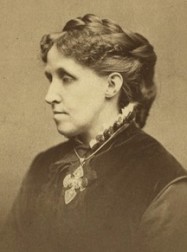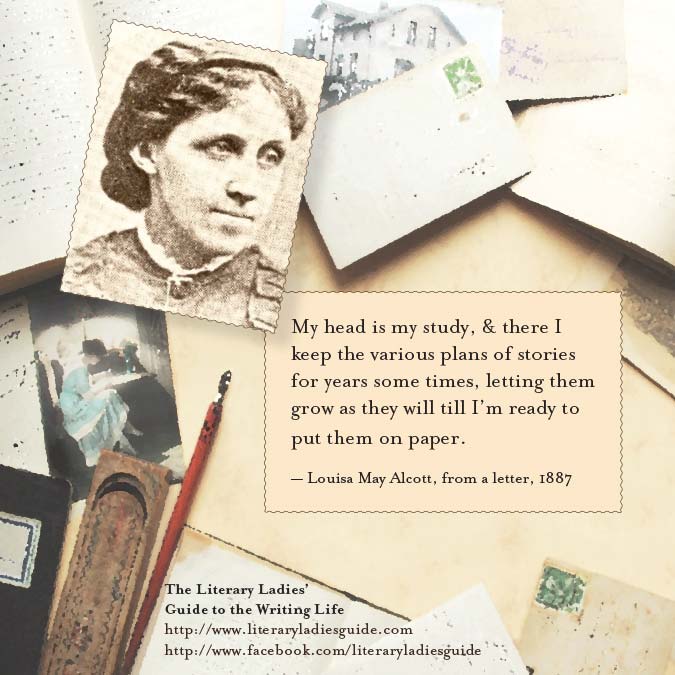“My Head is My Study”: On Developing Plots and Characters
By Kristi Holl | On February 19, 2017 | Updated February 16, 2020 | Comments (1)

On the subject of developing plots and characters, one of my favorite quotes on writing is from Louisa May Alcott, the author of Little Women and numerous other classics. She said:
“My methods of work are very simple and soon told. My head is my study, & there I keep the various plans of stories for years sometimes, letting them grow as they will till I am ready to put them on paper … While a story is under way I lie in it, see the people, more plainly than the real ones, round me, hear them talk, & am much interested, surprised, or provoked at their actions.” (from a letter to a journalist, 1887)
During the writing of my first ten or eleven novels, I always had from one to four babies, toddlers, and preschoolers underfoot. I desperately loved writing fiction, and I longed for the day when I could sit down at the typewriter, take a deep breath, close my eyes in solitude, and think about what I wanted to say. Developing plots and characters is challenging when time is at a premium.
However, with small children, you have to think on the run. My way of creating—like most young moms—was to do a lot of pre-thinking. I worked out plot twists and problems while washing dishes. I thought of titles and character names while folding diapers.
I rolled bits of dialogue around in my mind while pushing someone on the swing set or nursing or walking a teething baby. When no immediate demand required my attention, I lived in my head with my characters. As Louisa May Alcott so aptly put it, my head was my study.
I promised myself that this was a temporary way of writing, one I was eager to abandon as soon as I had more time. In actuality, it turned out to be an excellent way to write.
Lost in the desert of a writing dry spell
Babies and toddlers grow up and go to school. Mine did too, and I finally had that time to sit and think at the keyboard (a computer by that time). I quickly decided that I must have undiagnosed ADHD or something. I couldn’t sit still and think.
For the first time in my eight years of writing, I experienced the dreaded writer’s block I had read about in my writing magazines. So this is what they were talking about! It was truly awful, and no matter what suggestions I tried, nothing seemed to work. Often I would give up and go do some chores that waited or start editing assignments (I was teaching by then).
I was aggravated with myself that I wasn’t writing more and enjoying it more. For years, I had dreamed of the day I’d have peace and quiet to write. Now that it was here, I was stuck more often than not. But with student assignments to mark, there was no time to waste just sitting and staring at a blank screen. I needed to be productive with all the time I had while the kids were at school.
I didn’t realize at the time that I had lost the ability to have “head space,” as my writing friend calls it. “Head space” is that inner solitude where you go and ruminate on a story. It’s where you live in your head with your created story creatures, be they human or fantasy characters. It’s not a rushed place—you don’t hurry in, think a minute, then rush out. You live there for a while.
I didn’t just lose “my head is my study” ability for a short time. I lost it for years — close to twenty years, by my estimation. Oh, I still wrote and published a lot during that time…but the novels were no longer the kind that reached down deep inside me and pulled out the “good stuff.” (We all know what that feels like when we strike writing gold.)
I also wrote a lot of nonfiction during that time—all books I’m proud of—but nonfiction (for me, at least) doesn’t require head space. It’s more like writing term papers: just sit down and do it.
. . . . . . . . . .
You might also like: How can a writer improve her craft?
. . . . . . . . . . .
Unexpected recovery of the ability to write
However, last week I made the happy discovery that sometime in the last couple months, I have regained that ability to dwell in my own head space. This will sound silly, probably, but I was as excited as a kid on Christmas morning the first time it happened. I remembered that lovely feeling! And it came out of the blue.
When it happened a second time, and then a third time, I started paying attention to what was causing (or allowing) it. Each time I was pushing my one-year-old granddaughter in a stroller or in her swing in the back yard. The walks in the afternoon are up to an hour, and the swing time can last twenty minutes or more.
I realized that ideas were popping in my head. The voice of a character I had been struggling to “hear” suddenly started talking to me. She was real, and I knew her. The first time it happened, I held my breath, afraid she would disappear as suddenly as she’d surfaced. After it kept happening, I relaxed and blessed the unexpected side benefits of unrushed routine tasks.
“Brooding up” like L.M. Montgomery
L.M. Montgomery, author of the Anne of Green Gables books, the Emily of New Moon series, and many more, called this “dwelling in head space” process “brooding up.” It’s a way to juggle duty with a writing schedule, a way to think out plots and characters while attending to your job and motherhood. And Agatha Christie is famous for saying that her best time to plan a book was while doing the dishes.
“For anyone who doesn’t have the luxury of long hours to spend at the writing desk,” writes Nava Atlas in The Literary Ladies Guide to the Writing Life, “it’s comforting to know that your head can serve as your study…and that you can carry this portable work space wherever you go.” That is especially true with the complex process of developing plots and characters.
Yes, it’s a great comfort to me. Is it to you?
Contributed by Kristi Holl, editor and main contributor of Writer’s First Aid, an extensive resource for writers of all levels. She is the author of Writer’s First Aid (2006) and More Writer’s First Aid (2011).
. . . . . . . . . .
*This post contains affiliate links. If the product is purchased by linking through this review, The Literary Ladies Guide receives a modest commission, which helps maintain our site and helps it to continue growing!

Thanks for using my essay here! I’m so glad to be a part of your Literary Ladies blog and essay pages. Those ladies have such wisdom for us!